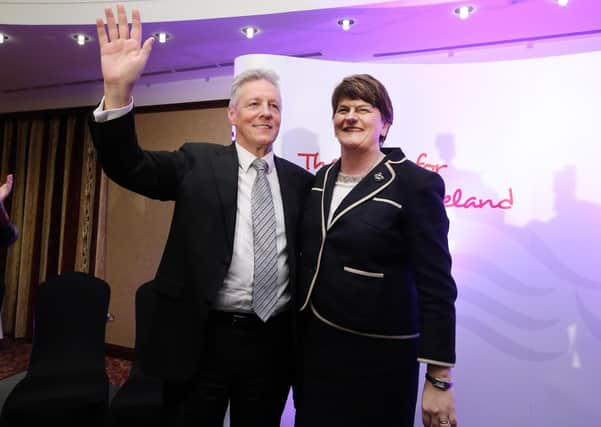More evidence Foster going against historic DUP ideology with controversial bill


Mrs Foster and Michelle O’Neill are attempting to rush through the Assembly with minimal scrutiny the Executive Committee (Functions) Bill, which would reduce the areas in which ministers have to ask the whole Executive to take a decision and give more autonomy to individual ministers.
The DUP leader’s support for the bill has caused alarm to her former senior special adviser Richard Bullick who has warned that it will involve a major weakening of what the party secured in the St Andrews Agreement when it centralised power in an attempt to stop a repeat of Martin McGuinness’s unilateral abolishment of the Eleven Plus.
Advertisement
Hide AdAdvertisement
Hide AdMrs Foster has not addressed that criticism and did not even appear in the Assembly chamber when the bill was nodded through at consideration stage by MLAs without even a debate on Tuesday.
Mrs Foster and Ms O’Neill have tabled the final two stages of the bill – further consideration stage, and final stage – for next Tuesday, meaning that it is likely to pass its final Assembly hurdle by then unless there is a major backbench DUP rebellion, or Mrs Foster decides not to move the bill.
Three weeks ago, Mrs Foster appeared before an Assembly scrutiny committee to set out details of the bill for the first time.
Explaining how the bill was a response to a court judgment – which actually reaffirmed the DUP’s historic interpretation of what had to come to the Executive, including what Mrs Foster had herself argued to the High Court – the First Minister argued that the judgment would create an unworkable situation in which all major planning decisions would have to come to the Executive.
Advertisement
Hide AdAdvertisement
Hide AdBut she then went on to say: “There are likely to be other cases, and not just planning cases, in which one minister has an interest in another minister’s decision.
“In fact, it could be argued that, because of the funding piece, the Finance Minister has an interest in all decisions that are taken. There is therefore a need to deal with that and to try to remove the vulnerability to challenging on the grounds that an issue is cross-cutting and therefore for the Executive to agree.”
However, far from the idea that the finance minister having to bring decisions to the Executive is a problem, DUP policy has long been to value the power to force such decisions into the Executive.
In November 2006, as the House of Commons discussed the Northern Ireland (St Andrews Agreement) Bill, the then DUP leader Peter Robinson made clear that he had given the government prior sight of a series of questions which he then asked on the floor of the Commons.
Advertisement
Hide AdAdvertisement
Hide AdIt appeared that Mr Robinson was asking questions to which he already knew the answers so as to get the government on the record as to how the deal should be interpreted.
Mr Robinson asked specifically about financial decisions involving the responsibilities of at least two ministers and asked if they would need to be discussed and agreed by the Executive.
NIO minister David Hanson responded: “His final point was whether any decision involving expenditure would require discussion and agreement by the Executive committee. The answer is yes.”
Setting out the wider DUP thinking, Mr Robinson also said in the debate: “This system is there as a protection—a safety net. It is not envisaged that every day ministers will run into an Executive and use their veto powers to stop decisions.”
——— ———
——— ———
A message from the Editor:
Advertisement
Hide AdAdvertisement
Hide AdThank you for reading this story on our website. While I have your attention, I also have an important request to make of you.
With the coronavirus lockdown having a major impact on many of our advertisers — and consequently the revenue we receive — we are more reliant than ever on you taking out a digital subscription.
Subscribe to newsletter.co.uk and enjoy unlimited access to the best Northern Ireland and UK news and information online and on our app. With a digital subscription, you can read more than 5 articles, see fewer ads, enjoy faster load times, and get access to exclusive newsletters and content. Visit https://www.newsletter.co.uk/subscriptions now to sign up.
Our journalism costs money and we rely on advertising, print and digital revenues to help to support them. By supporting us, we are able to support you in providing trusted, fact-checked content for this website.
Alistair Bushe
Editor